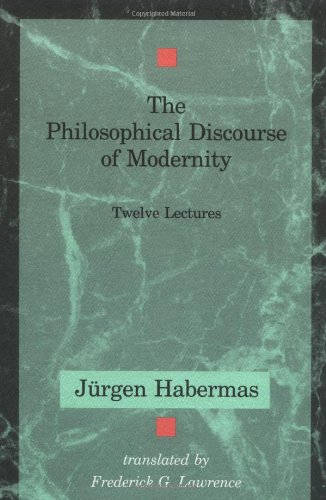The Philosophical Discourse of Modernity ebook
Par jones jeff le mercredi, juin 22 2016, 21:46 - Lien permanent
The Philosophical Discourse of Modernity. Frederick Lawrence, Jurgen Habermas, Thomas McCarthy

The.Philosophical.Discourse.of.Modernity.pdf
ISBN: 0745608303,9780745608303 | 456 pages | 12 Mb

The Philosophical Discourse of Modernity Frederick Lawrence, Jurgen Habermas, Thomas McCarthy
Publisher: Polity Press
The Philosophical Discourse of Modernity (1985) Alasdair MacIntyre 1929– A Short History of Ethics (1966); After Virtue (1981); Whose Justice? I was doing some copies of Leonardo DaVinci's anatomical studies while reading Jurgen Habermas' “The Philosophical Discourse of Modernity”. Discourse on Method (1637); Meditations on First Philosophy (1641); Replies to Objections to the Meditations (1641–2); Principles of Philosophy (1644); Passions of the Soul (1649) Blaise Pascal 1623–62 .. Horkheimer, Dialektik der Aufklärung, cit., pp. Exploring the Modern: Patterns of Western Culture and Civilisation, Blackwell, Oxford, 1998. 294-326, from The Philosophical Discourse of Modernity (trans. Cambridge, MA: The MIT Press, 1987. De Cive (1642); Leviathan (1651); De Corpore (1656); De Homine (1658) René Descartes 1596–1650. The Philosophical Discourse of Modernity book download. And the Dialectic of Reason, was indispensable for a new generation of scholars trying to make sense of Habermas' two-volume Theory of Communicative Action (1981) and his Philosophical Discourse of Modernity (1984). "Modernity: An Unfinished Project" Habermas and the Unfinished Project of Modernity: Critical Essays on the Philosophical Discourse of Modernity. Thus, on this line of reasoning, in the early twentieth century German philosopher Martin Heidegger theorized modernity as a huge system of “enframing” that reduced things to mere objects and functions available for human use. Moments of fascinated shock, when those categories fall apart that guarantee in everyday life the confident interaction of the subject with himself and with the world (Habermas, The Philosophical Discourse of Modernity, pp. Maurizio Passerin d'Entreves and Seyla Benhabib. Habermas, The Philosophical Discourse Of Modernity: Twelve Lectures, Translated by Frederick Lawrence. [1] Jürgen Habermas, “An Alternative Way out of the Philosophy of the Subject: Communicative versus Subjective-Centered Reason,” pp. Modernism as a Philosophical Problem, Oxford, 1991.